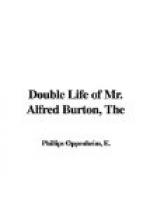It had been a dinner of celebration. The professor had ransacked his cellar and produced his best wine. He had drunk a good deal of it himself—so had Mr. Bomford. A third visitor, Mr. Horace Bunsome, a company promoter from the city, had been even more assiduous in his attentions to a particular brand of champagne.
Burton had been conscious of a sense of drifting. The more human side of him was paramount. The dinner was perfect; the long, low dining-room, with its bowls of flowers and quaint decorations, delightful; the wine and food the best of their sort. Edith, looking like an exquisite picture, was sitting by his side. After all, if the end of things were to come this way, what did it matter? She had no eyes for any one else, her fingers had touched his more than once. The complete joy of living was in his pulses. He, too, had yielded to the general spirit.
Edith left them late and reluctantly. Then the professor raised his glass. There was an unaccustomed color in his parchment-white cheeks. His spectacles were sitting at a new angle, his black tie had wandered from its usual precise place around to the side of his neck.
“Let us drink,” he exclaimed, “to the new company! To the new Mind Food, to the new scientific diet of the coming century! Let us drink to ourselves, the pioneers of this wonderful discovery, the manufacturers and owners-to-be of the new food, the first of its kind created and designed to satisfy the moral appetite.”
“We’ll have a little of that in the prospectus,” Mr. Horace Bunsome remarked, taking out his notebook. “It sounds mighty good, professor.”
“It sounds good because it is true, sir,” Mr. Cowper asserted, a little severely. “Your services, Mr. Bunsome, are necessary to us, but I beg that you will not confound the enterprise in which you will presently find yourself engaged, with any of the hazardous, will-o’-the-wisp undertakings which spring up day by day, they tell me, in the city, and which owe their very existence and such measure of success as they may achieve, to the credulity of fools. Let me impress upon you, Mr. Bunsome, that you are, on this occasion, associated with a genuine and marvelous discovery—the scientific discovery, sir, of the age. You are going to be one of those who will offer to the world a genuine—an absolutely genuine tonic to the moral system.”
Mr. Bunsome nodded approvingly.
“The more I hear you talk,” he declared, “the more I like the sound of it. People are tired of brain foods and nerve foods. A food for the moral self! Professor, you’re a genius.”
“I am nothing of the sort, sir,” the professor answered. “My share in this is trifling. The discovery is the discovery of our friend here,” he continued, indicating Burton. “The idea of exploiting it is the idea of Mr. Bomford. . . . My young friend Burton, you, at least, must rejoice with us to-night. You must rejoice, in your heart, that our wise counsels have prevailed. You must feel that you have done a great and a good action in sharing this inheritance of yours with millions of your fellow-creatures.”




